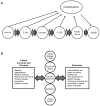Managing older adults with CKD: individualized versus disease-based approaches
- PMID: 22189037
- PMCID: PMC3261354
- DOI: 10.1053/j.ajkd.2011.08.039
Managing older adults with CKD: individualized versus disease-based approaches
Abstract
The last decade has seen the evolution and ongoing refinement of a disease-oriented approach to chronic kidney disease (CKD). Disease-oriented models of care assume a direct causal association between observed signs and symptoms and underlying disease pathophysiologic processes. Treatment plans target underlying disease mechanisms with the goal of improving disease-related outcomes. Because average glomerular filtrate rates tend to decrease with age, CKD becomes increasingly prevalent with advancing age and those who meet criteria for CKD are disproportionately elderly. However, several features of geriatric populations may limit the utility of disease-oriented models of care. In older adults, complex comorbid conditions and geriatric syndromes are common; signs and symptoms often do not reflect a single underlying pathophysiologic process; there can be substantial heterogeneity in life expectancy, functional status, and health priorities; and information about the safety and efficacy of recommended interventions often is lacking. For all these reasons, geriatricians have tended to favor an individualized patient-centered model of care over more traditional disease-based approaches. An individualized approach prioritizes patient preferences and embraces the notion that observed signs and symptoms often do not reflect a single unifying disease process and instead reflect the complex interplay between many different factors. This approach emphasizes modifiable outcomes that matter to the patient. Prognostic information related to these and other outcomes generally is used to shape rather than dictate treatment decisions. We argue that an individualized patient-centered approach to care may have more to offer than a traditional disease-based approach to CKD in many older adults.
Published by Elsevier Inc.
Figures
References
-
- Levey AS, Stevens LA, Coresh J. Conceptual model of CKD: applications and implications. Am J Kidney Dis. 2009;53(3 Suppl 3):S4–16. - PubMed
-
- Tinetti ME, Fried T. The end of the disease era. Am J Med. 2004;116(3):179–185. - PubMed
-
- Uhlig K, Boyd C. Guidelines for the Older Adult With CKD. Am J Kidney Dis. 2011;58(2):162–165. - PubMed
-
- Goodwin JS. Geriatrics and the limits of modern medicine. N Engl J Med. 1999;340(16):1283–1285. - PubMed
-
- National Kidney Foundation K/DOQI clinical practice guidelines for chronic kidney disease: evaluation, classification, and stratification. Am J Kidney Dis. 2002;39(2 Suppl 1):S1–266. - PubMed
Publication types
MeSH terms
Substances
Grants and funding
LinkOut - more resources
Full Text Sources
Medical


